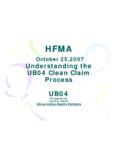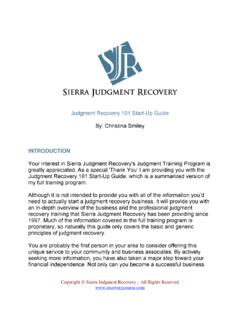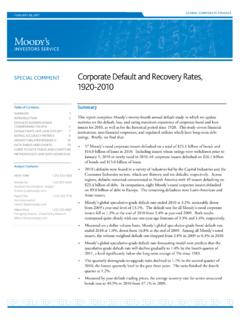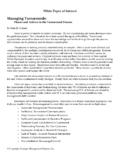Transcription of Judgment Enforcement Manual - Judgment …
1 JudgmentEnforcementManualRevision National Judgment Network1 WarningCopyright TX 6-866-862 This Manual contains proprietary information and may notbe reproduced in full or in part by any means is intended for the sole use of the National Judgment Networkmembers and may not be transferred, transmitted, resold, or given Manual is intended as information only and the publisher makes no warranties or representations of any kind regarding its accuracy. Readers are advised to conduct their own research carefully before actually attempting to engage in business. We assume no liability for any damage or loss that may result, directly or indirectly, as a result of the information contained in this Manual or on the NJN website. We are not engaged in providing legal advice or professional services. If legal advice is required, an attorney should be consulted. The contents of this Manual are intended for the use of National Judgment Network members only, and may not be reproduced in whole or in part in any fashion attempt to make this Manual as accurate as possible has been made.
2 While Judgment Enforcement is very similar in all states, there are differences in the Enforcement process from state to state. It will be the reader's responsibility to familiarize him or herself with state specific procedures. The contents of this Manual are current as of the date of publication but rules, regulations, and procedures within the industry change on a routine basis. The reader is encouraged to conduct his/her own research to ensure that he/she has the most current information are about to embark on an exciting and financially rewarding business venture. Judgment Enforcement is a legitimate business opportunity. It is not a get-rich-quick scheme. It will require an investment in both time and money. You will benefit from your new business in direct proportion to the amount of work you put into it. You have a great deal to learn, and will continue to learn throughout your career as a Judgment Enforcement information in this Manual has been compiled over years of enforcing judicial judgments and from the input of hundreds of National Judgment Network members.
3 While it is impossible to publish a Manual to cover every case you may encounter, this Manual will provide you with the foundation necessary to proceed. It will benefit you to acquaint yourself with all aspects of civil law concerning Judgment Enforcement . The World Wide Web and your local library are filled with information on this subject. Be bold in the pursuit of your business while exercising caution as your knowledge increases. You will most likely encounter a few unfamiliar legal terms as you read through this Manual . For that reason, you are encouraged to download the NJN Legal Dictionary, which can be found on the Downloads page of the NJN Website. Before proceeding, get comfortable and have a pen and pad handy so you can make notes as the journey PageTopicThe Judgment Recovery Business 7 .. Overview 9 .. Starting Your Business 11 .. The Court System 12.
4 Post- Judgment Interest 14 .. Soliciting Business 16 .. The Initial Contact 18 .. Pre-Assignment Investigation 19 .. The Assignment Process 21 .. Filing the Assignment 22 .. Locating the Debtor 26 .. Types of judgments 28 .. The Skip Trace Process 29 .. Asset Discovery 32 .. The Enforcement Process 34 .. Pretexts and Traps 37 .. The Consumer Credit Report 39 .. Settlement Offers 41 .. Proprietary NJN Programs 42 .. Sample Case 45 .. Frequently Asked Questions 47 .. In ConclusionDocuments and Letters 49 .. Sample Solicitation Letter (Individuals) 50 .. Sample Solicitation Letter (Businesses) 51 .. Sample Solicitation Letter (Real Estate Management) 52 .. Sample Acknowledgment of Assignment 53 .. Notary Statement 54 .. Sample Substitution of Attorney 55 .. Sample Agreement for Assignment 57 .. Debtor Profile Sheet 58 .. Sample Cover Letter 59 .. Sample Letter to Court Clerk 60.
5 Sample Foreign Judgment Affidavit 61 .. Sample Request to Correct Judgment 62 .. Sample Motion to Amend Judgment 63 .. Sample Wage Garnishment Document 65 .. Sample Demand Letter 66 .. Sample Settlement Offer 3 67 .. Sample Satisfaction of Judgment 68 .. Sample Pretext Letter 69 .. Sample Cover Letter to Credit BureausState Specific Information 71 .. Alabama 73 .. Alaska 76 .. Arizona 80 .. Arkansas 83 .. California 87 .. Colorado 90 .. Connecticut 95 .. Delaware 97 .. District of Columbia100 .. Florida104 .. Georgia108 .. Hawaii110 .. Idaho115 .. Illinois118 .. Indiana121 .. Iowa124 .. Kansas127 .. Kentucky129 .. Louisiana132 .. Maine135 .. Maryland139 .. Massachusetts142 .. Michigan145 .. Minnesota149 .. Mississippi152 .. Missouri155 .. Montana158 .. Nebraska161 .. Nevada165 .. New Hampshire168 .. New Jersey171 .. New Mexico175 .. New York178 .. North Carolina180 .. North Dakota183.
6 Ohio186 .. Oklahoma189 .. Oregon193 .. Pennsylvania4196 .. Rhode Island199 .. South Carolina202 .. South Dakota205 .. Tennessee208 .. Texas211 .. Utah214 .. Vermont217 .. Virginia220 .. Washington224 .. West Virginia227 .. Wisconsin230 .. Wyoming233 .. (Federal)Discussions and Tutorials236 .. Business Licensing238 .. Business Descriptions240 .. Agreement for Purchase of Judgment241 .. Business Structure243 .. Legal Forms245 .. The Enforcement Process248 .. Skip Tracing & Asset Discovery251 .. Membership Verification252 .. Fraudulent Conveyance254 .. Bank Account Discovery258 .. Garnishment263 .. Mail Drops267 .. Asset Research273 .. Hidden Assets276 .. The Mystery Of Hidden Assets281 .. Bankruptcy285 .. Changes To Bankruptcy Law291 .. Child Support Enforcement293 .. Collection Agencies295 .. Courthouse Records300 .. Credit Report Resources304 .. Deciphering A Check306 .. Deciphering SSNs309 .. Employment Discovery314.
7 Federal Jurisdiction316 .. Business Publicity318 .. Marketing On A Shoestring322 .. Writing A Press Release326 .. Hale Vs. Henkel5331 .. Judgment Liens334 .. Professional Liability335 .. Skip Trace Tips342 .. Statutory Analysis345 .. Telephone Pretexts352 .. The Unauthorized Practice of Law (UPL)367 .. Marketing and Advertising Tips386 .. Professional Certification387 .. NJN Code of Ethics391 .. VCIS Bankruptcy Searches403 .. Disclaimer and Copyright404 .. Recent Revisions6 OverviewA lawsuit commences when a claimant, called the Plaintiff, files suit against another party, called the Defendant. The parties can be individuals, corporations, partnerships, etc. If the claim is not resolved pre-trial, then the court will hear evidence from both sides and make a finding of fault and damages, called a Judgment . When the Judgment is rendered, the party that wins the award becomes known as the Judgment Creditor and the party that owes the award is called the Judgment Debtor.
8 Depending on the claim and/or counter-claims, it is possible for the Defendant to prevail over the Plaintiff and become the Judgment Judgment itself is nothing more than a piece of paper. It is placed on file at the courthouse and a copy is delivered to both the Judgment creditor and Judgment debtor. The court then takes no further action on the matter. Enforcement of the Judgment is the sole responsibility of the Judgment creditor. About 20% of judgments awarded by the court are actually paid by the Judgment debtor. The remaining 80% are simply never paid, primarily because the Judgment creditor is unfamiliar with the process of enforcing the Judgment . He could hire an attorney - but attorneys usually require a retainer fee, and can charge up to $200 per hour for their services. And, while most attorneys are very good at litigation, they generally do very poorly at Judgment Enforcement . As a matter of fact, you will very likely get a good number of referrals from Judgment creditor could retain a collection agency, but the FDCPA (Fair Debt Collection Practices Act, 805(c)) gives a debtor the right to simply tell the collection agency to cease and desist , and they must do so.
9 To avoid payment, the Judgment debtor may change his residence. He may even move out of state! If he has assets, he may hide them in an attempt to make himself Judgment proof, or immune to the Enforcement of a is where you come in. As a Judgment Enforcement specialist, you have the ability to conduct a skip trace to locate the Judgment debtor. You can conduct an asset search to discover his assets. And, you have the knowledge and resources to utilize the legal system to enforce, or execute, the Judgment . Before you can exercise these powers, you must first have the Judgment creditor sign the Judgment over to you, making you the assignee of record. Once the document, known as an Acknowledgment of Assignment of Judgment , has been filed with the court, the proceeds of the Judgment will be payable to you rather than the Judgment creditor, giving you the authority to pursue collection in your own behalf.
10 Thus, you will not be representing the Judgment creditor, but yourself!Assignment is a legal term the definition of which is The act of transferring an interest in property or some right (such as contract benefits) to another. It is used commonly by lawyers, accountants, business people, title companies and others dealing with property. It is the purpose of this Manual to educate you in the Enforcement process. We will cover each phase of the process, step by step. You will learn about business startup, where and how to obtain cases, customer relations, skip tracing, asset discovery, asset seizure, and legal procedures. Can we teach you everything there is to know about Judgment Enforcement ? No! You will find that each and every case is a learning experience. Over time you will hone your Enforcement skills. 7 You will learn by doing, and over time you will become more and more proficient!







